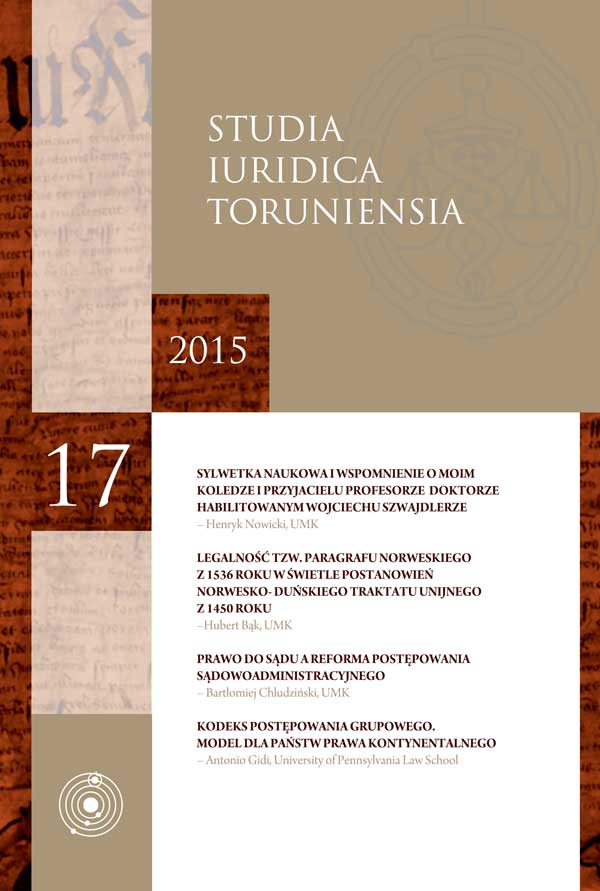On right to do wrong, criminal liability and the limits of prevention
DOI:
https://doi.org/10.12775/SIT.2015.025Keywords
responsibility, guilt, law, freedom, punishmentAbstract
The article concerns a wide problem of the relationship between the concept of freedom, law and legal responsibility (in the context of criminal responsibility and punishment). What conditions are necessary in order for a person to be legally responsible for what one does? Philosophers and lawyers generally agree that a person is responsible only if one is free. The concept of freedom is strongly connected with the concept of guilt. Guilt requires freedom. There are two main notions of „freedom”: a freedom of action and a freedom of will (which is legally irrelevant). Condition of responsibility is similar to the condition of guilt, i.e. a person is responsible or guilty for what one has done only if one could have done otherwise. However, it is assumed, that legally binding obligations deprive our freedom of action. It can be said, that a person is legally responsible for what one has done even if one could not have done otherwise. Prima facie in the field of law responsibility without freedom is a rule. In fact, it depends on the interpretation of the freedom, responsibility and guilt.
References
Bauman Z., Postmodern Ethics, Oxford 2002.
Bayles M.D., Criminal Paternalism, w: The Limits of Law, ed. J. Pennock, J. Chapman, New York 1974.
Berlin I., Cztery eseje o wolności, Warszawa 1994.
Burgh R. V., Do the Guilty Deserve Punishment?, „Journal of Philosophy” 1982, nr 4.
Christie N., Granice cierpienia, Warszawa 1991.
Czepita S., Istota wolności i jej granice w polskim systemie prawnym, „Prawo i Wież” 2014, nr 7.
Dennett D., Mechanism and Responsibility, w: Free Will, ed. G. Watson, New York–Oxford 1982.
Denning A., Freedom under the Law, Londyn 1949.
Duff R. A., Legal Theory Today. Answering for Crime, Oxford–Portland 2007.
Duff R. A., Punishment, Communication and Community, Oxford 2001.
Dworkin R., Biorąc prawa poważnie, Warszawa 1998.
Eisenstadt S., Utopia i nowoczesność, Warszawa 2009.
Fleurbaey M., Fairness, Responsibility and Welfare, New York 2008.
Frankfurt H., Alternatywne możliwości i odpowiedzialność moralna, w: Filozofia moralności. Postanowienie i odpowiedzialność moralna, red. J. Hołówka, Warszawa 1997.
Gaberle A., Od bezpieczeństwa prawnego do bezpieczeństwa osobistego (O kryzysie prawa karnego), „Państwo i Prawo” 2001, nr 5.
Gardocki L., Prawo karne, Warszawa 2010.
Golash D., The Retributive Paradox, „Analysis” 1994, nr 2.
Griffin J., Sąd wartościujący, Warszawa 2000.
Hampton J., Liberalism, retribution and criminality, w: In Harm’s Way: Essays in Honor of Joel Feinberg, ed. J. L. Coleman, A. Buchanan, Cambridge 2007.
Hirsch H.J., Problem odpowiedzialności karnej osób prawnych, „Przegląd Prawa Karnego” 1993, z. 4.
Honore T., Responsibility and Fault, Oxford 2008.
Ingarden R., Książeczka o człowieku, Warszawa 2009.
The Collected Works of John Stuart Mill, ed. J.M. Robson, Toronto 1979.
Kane R., A Contemporary Introduction to Free Will, New York–Oxford 2005.
Kaufman A. S., The Reform Theory of Punishment, , Ethics 1960, nr 1.
Krajewski K., Teorie kryminologiczne a prawo karne, Warszawa 1994.
Kraus J., The Limits of Hobbesian Contractarianism, Cambridge 2002.
Krolikowski M., Komunikacyjne teorie kary jako współczesne retrybutywne uzasadnienia kary kryminalnej, „Studia Iuridica” 2004, t. XLIII.
Kymlicka W., Współczesna filozofia polityczna, Warszawa 2009.
Lyons D., Etyka i rządy prawa, Warszawa 2002.
Małek M., Liberalizm etyczny Johna Stuarta Milla. Współczesne ujęcia u Johna Graya i Petera Singera, Wrocław 2010.
Marciano A., Constitutional Mythologies, New York–Dordrecht-Heidelberg–London 2011.
Marek A., Prawo karne, Warszawa 2000.
Marmor A., Right-Based Justification of Punishment, Israel Law Review 1987–1988, nr 22.
Mill J. S., Utylitaryzm. O wolności, Warszawa 2005.
Morris H., Persons and Punishment, The Monist 1968, nr 52.
Nozick R., Anarchia, państwo, utopia, Warszawa 2010.
Olejnik S., Odpowiedzialność moralna zmniejszona, Roczniki Filozoficzne 1962.
Pink T., Free Will land Determinism, w: A Companion to the Philosophy of Action, ed. J. T. O’Connor, C. Sandis, Oxford 2010.
Polanowska-Sygulska B., Filozofia wolności Isaiaha Berlina, Kraków 1998.
Ross A., On Guilt, Responsibility and Punishment, Berkeley–Los Angeles 1975.
Sadurski W., Teoria sprawiedliwości. Podstawowe zagadnienia, Warszawa 1988.
Schopp R. F., „So Sick He Deserves It”: Desert, Dangerousness, and Character in the Context of Capital Sentencing, w: Action, Ethics, and Responsibility,
ed. H. S. Silverstein, M. O’Rourke, J. K. Campbell, Cambridge, Mass 2010.
Stelmach J., Brożek B., Soniewiecka M., Załuski W., Paradoksy bioetyki prawniczej, Warszawa 2010.
Utrat-Milecki J., Podstawy penologii. Teoria kary, Warszawa 2006.
Waldron J., A Right to Do Wrong, „Ethics” 1981.
Wojciechowski B., Hegla filozofia kary, „Ius et Lex” 2006, nr 1.
Wojciechowski B., Interkulturowe prawo karne. Filozoficzne podstawy karania w wielokulturowych społeczeństwach demokratycznych, Toruń 2009.
Woleński J., Wolność, determinizm, indeterminizm, odpowiedzialność, „Śląskie Studia Teologiczno-Historyczne” 1996, nr 29.
Wootton B., Social Science and Social Pathology, London 1959.
Wronkowska S., Ziembiński Z., Zarys teorii prawa, Poznań 2001.
Zaibert L., Punishment and Revenge, Law and Philosophy 2006, nr 25.
Zieliński M., Wykładnia prawa. Zasady, reguły wskazówki, Warszawa 2010.
Downloads
Published
How to Cite
Issue
Section
Stats
Number of views and downloads: 528
Number of citations: 0



